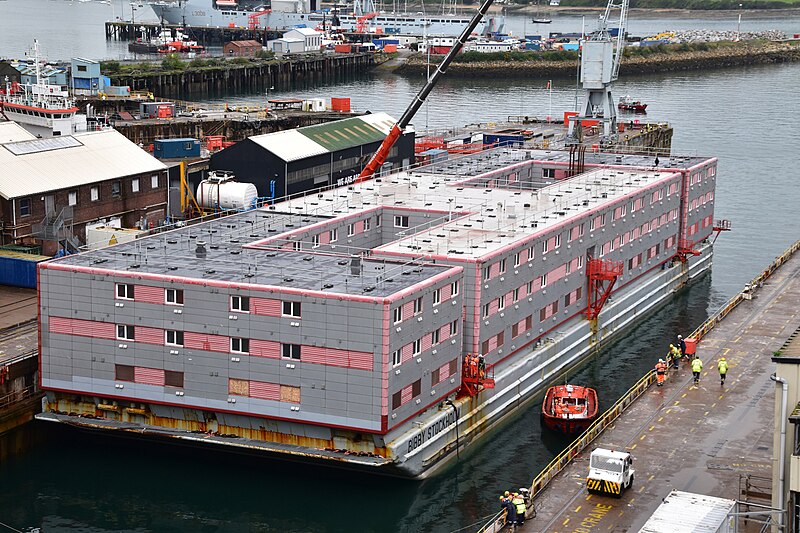
A temporary evacuation of migrants from the Bibby Stockholm barge has been initiated following the discovery of traces of Legionella bacteria in the water.
Sources reveal that routine water testing was conducted prior to the migrants' accommodation on the vessel, docked in Dorset.
However, the results revealing the presence of the bacteria only emerged after the migrants had already boarded the barge.
As a precautionary measure, the Home Office has arranged for the 39 migrants on board to disembark while comprehensive assessments are carried out.
Legionella is the bacterium responsible for Legionnaires' disease, a form of pneumonia.
While migrants have utilized the onboard water supply, no symptomatic cases have emerged thus far, although they have been relocated from the barge as a preventive measure.
A subsequent test has also been conducted, and it is anticipated that the migrants will be permitted to return once the water supply is confirmed to be free from bacteria.
Reliable sources indicate that the UK Health and Security Agency has recommended additional water supply testing.
'No Presentations of Symptoms' Government insiders assert that they are adhering to UKHSA guidelines and have exceeded recommendations by temporarily relocating individuals from the barge.
Occupants of the barge had recently moved in this week after a series of delays attributed to fire safety concerns.
The vessel, stationed at Portland Port along the southern coast, constitutes a part of the government's initiative to deter migrant Channel crossings and impede their maritime journeys.
Under the government's plan, Bibby Stockholm was intended to accommodate up to 500 males aged 18 to 65 while they await the resolution of their asylum applications.
A spokesperson from the Home Office conveyed, "No individuals on board have presented with symptoms of Legionnaires', and asylum seekers are being provided with appropriate advice and support. The samples taken relate only to the water system on the vessel itself and therefore carry no direct risk indication for the wider community of Portland nor do they relate to fresh water entering the vessel. Legionnaires' disease does not spread from person to person."
Legionella bacteria can cause a severe infection known as Legionnaires' disease.
Although these bacteria are typically found in rivers and lakes, they can thrive and proliferate extensively within water tanks and plumbing systems.
This becomes problematic when individuals inhale contaminated water, and the bacteria enter the lungs.
For instance, a shower that generates a mist containing Legionella bacteria could pose a risk.
Once within the lungs, the bacteria can trigger pneumonia, characterized by symptoms like coughing, breathlessness, and fever.
Infected individuals require antibiotics, and in severe cases, oxygen therapy or mechanical ventilation may be necessary. Photo by Wikimedia commons.



































